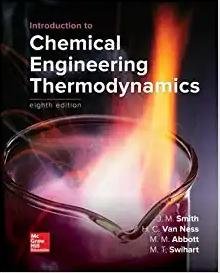As noted in Ex. 6.6, H lv is not independent of T; in fact, it becomes
Question:
As noted in Ex. 6.6, Δ H lv is not independent of T; in fact, it becomes zero at the critical point. Nor may saturated vapors in general be considered ideal gases. Why is it then that Eq. (6.89) provides a reasonable approximation to vapor-pressure behavior over the entire liquid range?
Exercises 6.6
A pure fluid, described by the canonical equation of state: G = F(T) + KP, where F(T) is a substance-specific function of temperature and K is a substance-specific constant. Determine for such a fluid expressions for V, S, H, U, CP, and CV. These results are consistent with those for an important model of liquid-phase behavior. What is the model?
Eq. (6.89)

Step by Step Answer:

Introduction To Chemical Engineering Thermodynamics
ISBN: 9781259696527
8th Edition
Authors: J.M. Smith, Hendrick Van Ness, Michael Abbott, Mark Swihart





